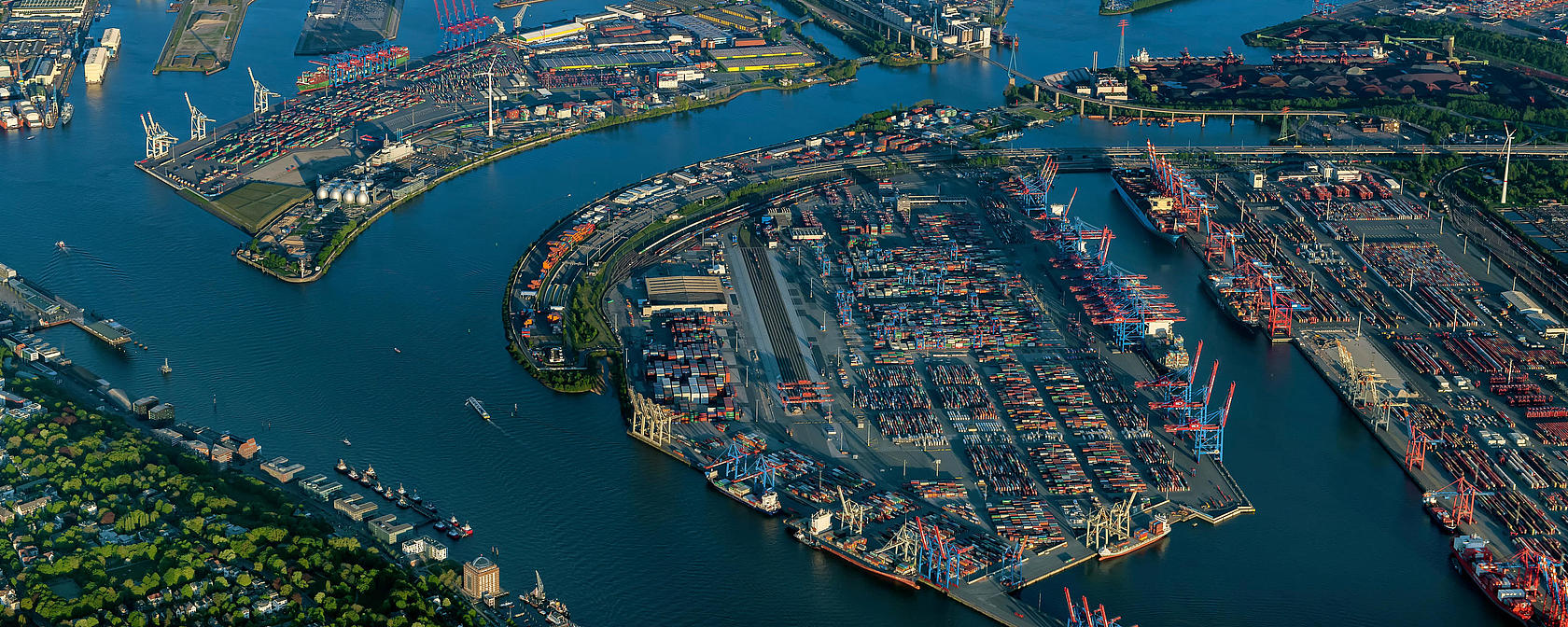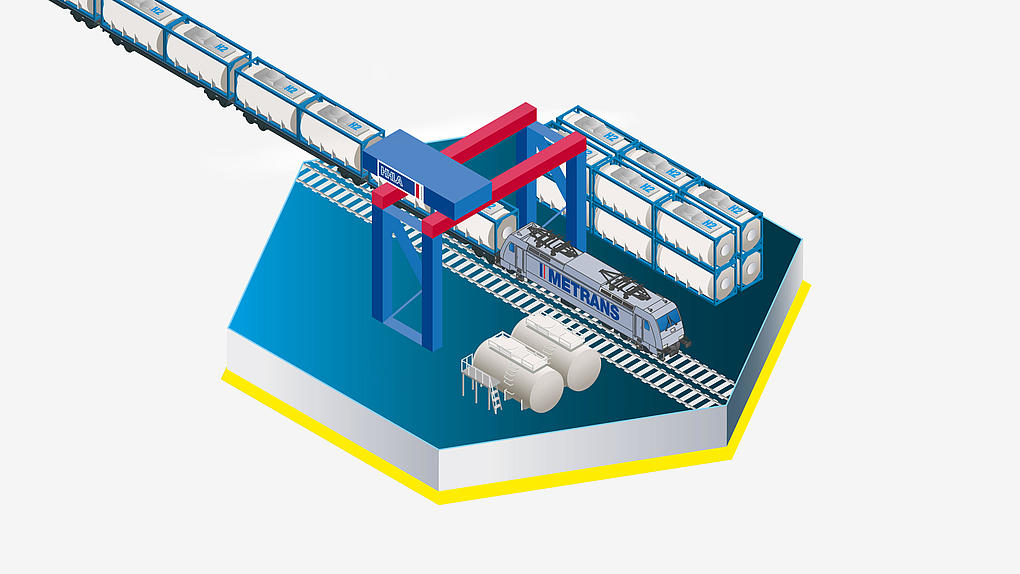Quicklinks
Quicklinks

Georg Böttner is responsible for the hydrogen strategy at Hamburger Hafen und Logistik AG. In this HHLA Talk, we discuss how hydrogen as an energy source can drive forward decarbonisation and what opportunities it creates for HHLA. Strategic partnerships and participation in nationwide projects such as TransHyDE have already been set in motion.


Hydrogen as an energy carrier can contribute to HHLA's decarbonisation. The distribution of hydrogen is also a growth opportunity for the company.
Hydrogen is a versatile element and has been used as a base material in the chemical industry for decades. Recently, however, it has also been a source of hope in terms of the energy transition. That is why we are looking at hydrogen in this issue of the HHLA magazine. Our guest is Georg Büttner. He’s responsible for the hydrogen strategy at the Hamburger Hafen und Logistik AG. Georg, tell us how you got this exciting job.
It was a long road to this exciting job. I’ve been working in the Port of Hamburg since 2004 in various functions, from lawyer to managing director of an energy company, a service company and a container terminal. This means I have a really good overview of what goes on here at the Port of Hamburg.
Then let’s start with the central question: what makes hydrogen so attractive an energy source that everyone is now talking about it?
That is a wide field and a big question. I’ll try to keep it short. In the past year, we’ve been making some changes in terms of the energy transition. We want to get out of nuclear energy. We want to shut down the coal-fired power stations. We want to roll back the use of fossil fuels altogether. And all of this has to be achieved in an industrial nation. Of course it helps to electrify as much as possible, but I also think about the steel industry, the chemical industry and especially about heavy-load road vehicles, which are dependent on a material energy source. The great thing about hydrogen is that it’s amazingly versatile in its implementation in many industries and as a base material for many products. That’s what makes it so interesting.
You just touched on it: as a port and logistics company, HHLA has to transport a lot of heavy loads, mostly containers. Does a power source like hydrogen have advantages over electric vehicles?
Yes, for many different reasons. First, we (meaning Germany and the European Union) have undertaken some tremendous tasks in terms of the energy transition. And this means that we want to do a tremendous amount of electrification: private vehicles, apartment heating ... We want to switch to green energy. But we all know that our power grids are already under extreme strain and we are constantly getting into situations where we cannot access the full power of renewable energies. This is where hydrogen has the advantage – it is a buffer for these energy sources. For companies in logistics, it can be available 24/7, 365 days a year for heavy-duty transport.
Could you take a moment to explain the difference between hydrogen power and fuel cell power?
Hydrogen can be used in many forms as an energy source for propulsion. In a fuel cell, hydrogen is converted into electricity, which then propels an electric motor. It’s also possible to burn hydrogen and use it in a normal combustion engine.
It is our aspiration to combine ecological, social and economic interests in order to make our company future-proof. We underline this with our "Balanced Logistics" sustainability strategy.
Read moreSo hydrogen is used in the vehicle to generate electrical energy, which in turn can be used to drive four small electric motors, for instance. This means less energy is used, for example, to move a truck.
Exactly! There is then no friction loss due to gearboxes or long drivetrains, because the drive can be provided directly at the axle. This means that we combine the advantages of an electric drive with the advantages of a material energy source. Namely, fast refuelling and a relatively long range, regardless of the state of our power grids.
So, we are using the new fuel cell technology to decarbonise heavy-duty transports and container transports at our terminals.
At HHLA, we work in a lot of directions. For AGVs, our automated container transporters, we use electricity. But energy requirements for straddle carriers, for example, are significantly higher again than for other vehicles because they’re not just driving, they’re also raising and lowering containers. At the moment, it looks like hydrogen could be a very good alternative.
Now to the practicalities: are we already cooperating with manufacturers?
Yes, we have been working on this for a good year now and are connecting with quite a few manufacturers, not only of heavy-duty equipment. Together, we want to test the advantages in practical operation that we know or think we know from theoretical considerations. As I said, this is not just limited to vehicles, but even extends to Airbus. We are also talking to them about cooperation on training topics and trying to undertake something together to bring the new hydrogen economy forward.
Yes, the new hydrogen economy is, of course, more than just container transport. There is a lot more potential there for HHLA as well.
That’s exactly how we see it. HHLA’s core expertise is in handling and logistics. Therefore, at the beginning of our activities, we really asked ourselves the question: how can we at HHLA contribute to the energy transition with our skills? And we found a lot of answers! We have handling facilities. We have a network on which we transport loads and containers to the hinterland. And when I say hinterland, I mean centres in industrial regions where a huge demand for hydrogen will develop, in our opinion. This just makes it very wise for us to be involved in the field.
In other words, we can imagine establishing ourselves in the sector of hydrogen storage, handling and transport.
Exactly. We have a strong presence in the field. We have one of the biggest intermodal networks in Europe. We have numerous locations. We operate over 600 block trains that travel all across Europe every week. No one will be catching up to us quickly. We have a network of terminal locations in consumer regions, like Hamburg, Trieste and Tallinn. And we also have locations in producer regions, like Odessa. This all combines to form a great package.
Yes, this sounds like quite a lot of projects that HHLA is addressing at the same time. Is it also possible that a few of them ultimately may not end up being implemented?
If one of us had the ability to look into a crystal ball and see the future – and we’re talking about 2040 or 2050 here – then they would have it made. Of course, there will be many trials and tribulations on the way to this hydrogen economy. That is also why we have joined forces in a broad network with manufacturers and producers as well as government agencies, such as the Federal Ministry of Education and Research, to be able to cushion the risks that arise from such a development.
That means we are also involved in sponsored projects. And right now, there is a huge range of funds in this field from a variety of sources.
I would like to give just one example here. We are part of the TransHyDE project, which is specifically about our core expertise, including the storage, handling and transport of hydrogen in carriers. And that’s something that we can contribute to.
There’s a lot of research to be done on the carrier substances, too. Which substances could these be, according to you? I have heard a lot about ammonia, but what else is there?
There is the organic hydrogen carrier known as LOHC. Then there’s ammonia, but also methanol. This isn’t a carrier substance, but liquid hydrogen is another possibility. While others get sweaty palms when thinking about handling these substances, we can say: we’re already doing it. And not just since yesterday, we’ve been doing it for decades.
Eventually, it could be possible to transport hydrogen in containers, just like other dangerous goods.
How to make that happen will be part of the research.
HHLA’s not the only one with a hydrogen strategy – Hamburg, Germany and the EU also do. So, it looks like Europe is pretty far ahead with this technology. Is that right?
Germany is a pioneer of hydrogen in Europe. We were one of the first countries to adopt a hydrogen strategy. Northern Germany – and with that I mean the five coastal states – also contributed with their own strategy. Minister Westhagemann from the office of economics played a huge part in this, because he really pushed for hydrogen in Hamburg, as well as across northern Germany. Following Germany, the rest of the countries in Europe have also climbed aboard. In practically every European country, we’ve got billions of euros in funding that will be invested in hydrogen. The European Commission also identified hydrogen as an essential energy source in their Green Deal. However, the Chinese are also very early to the game, with state management and strong commitment. Our American friends have also been active for decades in the area of hydrogen for other reasons. So we can’t say that we are in first place, but we’re definitely in a great starting position and it’s important for us to utilise this.
In Hamburg – as you just mentioned – Minister Westhagemann is promoting the topic of hydrogen with his personal commitment. There are a lot of established projects here – is a hydrogen cluster with international reach currently developing on the river Elbe?
I think it is, yes. Although it’s always better to make the assessment afterwards. But one thing is true: a great deal is developing in this area. Within the framework of a European scheme, the IPCEI projects, we have founded a hydrogen network that produces and applies hydrogen in aviation and logistics, right through to its transport. Here it becomes clear once again that in Hamburg you can do almost everything in a small area. That is one of the great advantages of this region. And in my opinion, this will also lead to the formation of a cluster here.
That could represent outstanding future prospects, also for the region around the port. Do you think that HHLA will play an essential role?
I think we have all the prerequisites to do so. I’ve already spoken about our network and our handling terminals. What I haven’t mentioned yet – and this is our biggest treasure – are the many wonderful and well qualified employees. These employees can work in hydrogen in the future, in the maintenance and technology area that is experiencing some turmoil at the moment. We can help employees get qualified to change from fossil fuels to fuel source technology and help the structural transformation at the Port through the implementation of this new technology. With this, we will help strengthen Hamburg’s position as an economic region and as a port city.